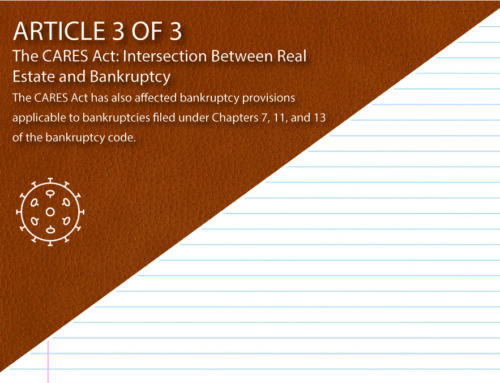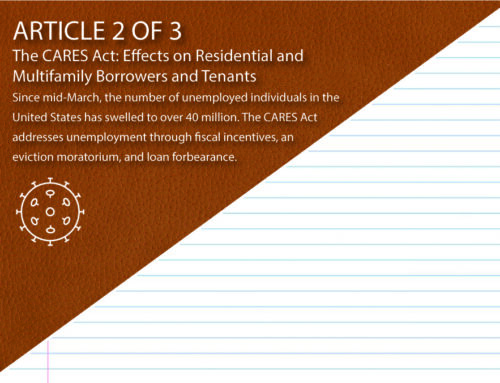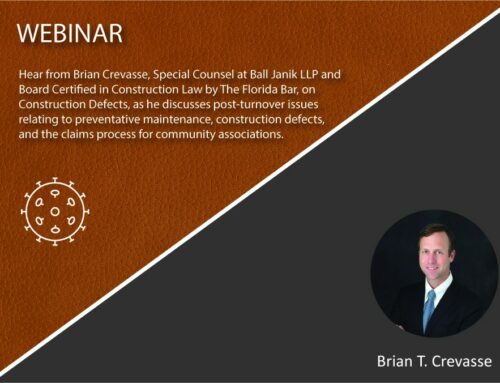The COVID-19 pandemic has had sweeping impacts on real estate and real estate law, particularly on commercial landlords, developers and owners of real estate, real estate entities contemplating bankruptcy, government facilities, residential and multifamily borrowers and tenants. This three-part article series will address these topics with a focus on the Coronavirus Aid, Relief and Economic Security Act (the CARES Act), signed into law on March 27, 2020.
The CARES Act directly and indirectly assists commercial landlords via several mechanisms including:
- Use of retirement funds
- Paycheck Protection Payment (PPP) loans
- SBA Economic Injury Disaster Loans (EIDL)
- Income assistance direct payments (checks to individual taxpayers)
- Enhanced unemployment benefits
Each of these fiscal incentives increase the ability of commercial tenants to make rent payments and may also directly assist commercial landlords depending upon their organizational structure.
Retirement Funds
Section 2202 of the CARES Act waives early withdrawal penalties on up to $100,000.00 of qualified retirement funds if used for virus-related purposes. Virus-related purposes include distributions made between January 1, 2020 and December 31, 2020 by an individual diagnosed with COVID-19, whose spouse or dependent is diagnosed with COVID-19, or who experiences adverse financial consequences due to COVID-19, including being furloughed or experiencing a lack of childcare. An employee seeking this waiver need only certify to their retirement plan administrator that they meet one or more of these criteria to obtain its benefits. Individuals contemplating this option are strongly encouraged to obtain tax advice.
PPP Loans and the Paycheck Protection Program Flexibility Act (PPPFA)
PPP loans administered by the Small Business Administration (SBA) may be used for payroll expenses, including rent, and are forgiven if they meet particular criteria. Applications may be made through June 30, 2020. Throughout April and May 2020, SBA and the U.S. Treasury have been issuing evolving guidance on various issues related to PPP loans.
On June 3, 2020, the PPPFA was passed to address concerns raised by the small business community. It alters the PPP program in 5 major ways:
- Reduces the amount business are required to spend on payroll from 75% to 60%
- Extends the time period to use funds from 8 to 24 weeks
- Extends the deadline to rehire workers from June 30, 2020 to December 31, 2020 for their salaries to count toward loan forgiveness
- Reduces rehire requirements if the business can demonstrate an inability to rehire or return to the level of business activity experienced prior to February 15, 2020
- Extends the repayment term for loans either not forgiven or partially forgiven from 2 to 5 years
Due to the rapid changes in the standards and process for applying for, complying with, and obtaining forgiveness of PPP loans, we recommend consultation with legal counsel to maximize PPP benefits and compliance.
EIDL Loans
The SBA also administers Economic Injury Disaster Loans (EIDL) of up to $2 million for small businesses to assist them in overcoming a temporary loss of revenue. An EIDL could be an option for a commercial landlord or tenant with little to no employment expenses. Due to limitations in funding availability and the unprecedented submission of applications, only agricultural business applications are currently being accepted by the SBA. However, the Health and Economic Recovery Omnibus Emergency Solutions Act (HEROES Act) was passed by the House of Representatives on May 15, 2020. If passed by the Senate, it would provide an additional $10 billion for EIDL loans.
The EIDL application deadline is December 16, 2020 in most states. To be eligible, a business must have been in existence as of January 31, 2020 and have less than 500 employees. Therefore, EIDLs are available for sole proprietorships, independent contractors, and private nonprofits. However, applicants are encouraged to review any existing financing to determine whether their lender has restrictions on obtaining additional funding.
Federal Sites or Leased Facilities
Section 3610 of the CARES Act provides payments to employees working on federal sites or federally leased facilities. Payments may be made until September 30, 2020 to reimburse federal contractors for paid leave of up to 40 hours per week. These payments are meant to ensure that federal contractors are ready to continue to work on federal sites when COVID-19 related restrictions are lifted. Payments are discretionary and are determined by the federal agency engaged with the contractor.
Commercial Landlord Actions
Considering the uncertainties regarding federal programs, funding, and current unemployment rates, commercial landlords have significant incentive to be proactive in their negotiations with tenants. Landlords and tenants often share the common interest in the tenant remaining adequately funded to be viable and continue to pay rent. Accordingly, landlords may benefit from proactively informing tenants of the federal and state relief programs available to tenants and encourage tenants to apply. As always, substantive communications with tenants should be confirmed in writing and landlords should avoid inadvertently modifying or waiving any lease requirements.
Landlords should review their leases if tenants assert that the COVID-19 pandemic qualifies as force majeure, impossibility, impracticability, frustration of purpose, or any other theory that would forgive tenant rent obligations. Generally, the bar to demonstrate such legal arguments is high. Landlords should also review their leases for use restrictions such as continuous operations, access, exclusive and other use restrictions in light of state/local regulations. For example, allowing dine-in restaurant tenants to convert to take-out only service.
Commercial landlords with mortgages should review cash flow or financial covenants, review limitations on ability to modify, cancel or amend leases, and review property management agreements or other key contracts. Landlords should also evaluate whether to impose new or increased health and safety regulations and/or cleaning services in common areas.
Finally, landlords should identify their insurance benefits such as business interruption, rent loss and similar policy provisions to determine whether the policy provides recourse. If available, it is prudent to keep comprehensive records of all losses and to file your claim before the statute of limitations expires. Consult with counsel to form a strategy, especially if your insurer denies a claim.
This article is for informational purposes only and is not intended as legal advice. This is a rapidly evolving area of law and this article is only current as of its date of publication. Please reach out to Ball Janik, LLP for the most updated information, state-specific information, and legal advice. Please also visit our COVID-19 webpage for additional resources by industry.






